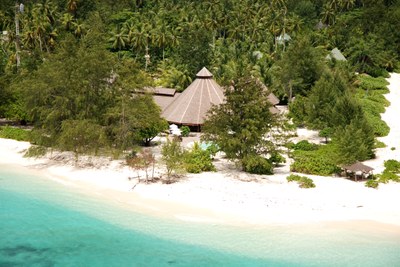The COAST Project Sharing Results on the Seychelles Sustainable Tourism Label (SSTL)
An Overview of the Tourism Industry in Seychelles
 Tourism is one the main pillars of the Seychelles economy. The sector contributes at least 25% to the Gross Domestic Product and provides approximately 15% of direct employment[1]. During the past decade, the industry has grown substantially with new tourism products coming online and achieving record numbers in terms of tourist arrivals. Over the recent years, the sector has increasingly recorded the highest number of visitors. For instance, statistics for 2012 shows a record with just over 208,000 visitors, the majority from France, Germany, Italy and Russia which account for 60% of the total visitors to the country.
Tourism is one the main pillars of the Seychelles economy. The sector contributes at least 25% to the Gross Domestic Product and provides approximately 15% of direct employment[1]. During the past decade, the industry has grown substantially with new tourism products coming online and achieving record numbers in terms of tourist arrivals. Over the recent years, the sector has increasingly recorded the highest number of visitors. For instance, statistics for 2012 shows a record with just over 208,000 visitors, the majority from France, Germany, Italy and Russia which account for 60% of the total visitors to the country.
Balancing Seychelles’ Tourism Growth and Preserving its Fragile Biodiversity
The growth in tourism during the past ten years has also resulted in more pressure on the local resources of the country. As a result of this, the Seychelles Government has had to balance between needs of economic development and the ever rising need to lessen and mitigate the negative impacts of such developments on the environment and its natural resources. This has led the country to shift its focus to market Seychelles as an eco-tourism destination. As a result of this initiative, the tourism industry in Seychelles has become more conscious of sustainability principles and practices resulting in the discovery of more nature-based attractions, products and services within the tourism attractions.
As a fragile ecosystem, the Seychelles archipelago belongs to one of the major biodiversity hotspots in the world. Approximately 47% of the country’s landmass, and some 228km2 of its ocean territory, are under some form of protected status. However, Seychelles’ biodiversity remains at risk from a variety of human induced pressures; making the conservation and sustainable use of biodiversity to be of vital importance for the country’s sustainable development. In this regard, the Seychelles Government’s decision to adopt the Seychelles Sustainable Tourism Label (SSTL) sought to ensure continuous sustainability of the country’s most vital sectors; tourism and the natural resources it depends on, the environment.
The Use of SSTL Label to Support a Shift to Sustainability in the Tourism Industry in Seychelles
 So far, five hotels have been certified with the SSTL label, they are the Constance Ephelia Resort and Spa; the Berjaya Beau Vallon Bay Resort and Casino; the Hanneman Holliday Apartment. Two other hotels, the Kempinski Seychelles Resort and the Banyan Tree Seychelles successfully assessed and received their certification on 21st September, 2013. There are also a number of hotels that have expressed interest in the label and are at various stages of preparation of accessing the label. Getting hotels to apply for the label involves various correspondence, meetings, and explaining the criteria and their benefits. As a form of encouragement, the smaller establishments are provided with free technical assistance by the Government.
So far, five hotels have been certified with the SSTL label, they are the Constance Ephelia Resort and Spa; the Berjaya Beau Vallon Bay Resort and Casino; the Hanneman Holliday Apartment. Two other hotels, the Kempinski Seychelles Resort and the Banyan Tree Seychelles successfully assessed and received their certification on 21st September, 2013. There are also a number of hotels that have expressed interest in the label and are at various stages of preparation of accessing the label. Getting hotels to apply for the label involves various correspondence, meetings, and explaining the criteria and their benefits. As a form of encouragement, the smaller establishments are provided with free technical assistance by the Government.
The concept behind the development of the Seychelles Sustainable Tourism Label (SSTL) originated from the Tourism Department, Ministry of Tourism and Transport work in the preparation of Vision 21, a national blueprint, which entailed a comprehensive Tourism Master Plan 2001-2010 and the Seychelles Eco-Tourism Strategy for the 21st Century (SETS-21). The Seychelles Ministry of Tourism and Transport adopted the SSTL project in 2004 (and later the Seychelles Tourism Board in 2007) and conducted preparatory research on sustainable tourism Labels. As a follow up, a committee of key stakeholders was established and a set of preliminary criteria developed. The draft criteria were piloted by the STB but the SSTL award scheme could not be implemented due to lack of financial resources. After some 5 year lull, the SSTL project gathered steam towards the end of 2009 through a UNDP-GEF supported initiative to mainstream biodiversity management into production sector activities.
The Seychelles Sustainable Tourism Label – How It Works
|
The SSTL aims to have participating hotels operate under the following basic principles:
Expected benefits for Participating Hotels 1.Marketing Related benefits
|
|
MAIN ENVIRONMENTAL ISSUES UNDER THE SSTL Management - This section includes policy, monitoring, health and safety. It requires some sustainability documentation that will ensure the hotel’s sustainability initiatives are undertaken systematically.
|
Incentivizing Sustainability in Tourism: Lessons from the Seychelles on the SSTL Scheme
Clearly, adopting a green label is not without its challenges. Although the Government of Seychelles is even offering financial concession by waiving taxes on the importation of energy efficient appliances for instance, this is still not a significant enough as an incentive to encourage all the hotels to work to get certification under the label. Some of the smaller hotel operators still feel that they should not have to pay an application fee to participate in the scheme, and need more concessions from the Government.
In addition, for such sustainability schemes to succeed, it is important for the country to lay in place proper supporting policies, facilities and infrastructure, in line with the requirements of such a label. A good example on this issue is the requirement by the SSTL that all participating hotels should separate their waste into various components (organic and inorganic). This criterion is proving to be a problem to execute since the country lacks adequate waste recycling facilities locally which would have benefited immensely from the readily sorted raw materials. However, the government is aware of this and is working to address it.
 Finally, to ensure the effectiveness of such a label, various things have to be taken into consideration. Like the SSTL, which was developed in line with the Global Sustainable Tourism Council criteria, the label should be aligned to such a widely recognized and respected framework, making it easier for such a label to be recognized and adding to its global credibility. It is important to also set in place an independent Awards Panel to endorse the certifications and to assure transparency for the programme. The label also requires a strong awareness creation and capacity building programme at the initial stage of the project to generate more interest and buy-in The COAST Project is indeed proud to be associated with the Seychelles Sustainable Tourism Label, and acknowledges the label as a useful Best Available Practice that can be easily replicated within tourist destinations in Africa and beyond.
Finally, to ensure the effectiveness of such a label, various things have to be taken into consideration. Like the SSTL, which was developed in line with the Global Sustainable Tourism Council criteria, the label should be aligned to such a widely recognized and respected framework, making it easier for such a label to be recognized and adding to its global credibility. It is important to also set in place an independent Awards Panel to endorse the certifications and to assure transparency for the programme. The label also requires a strong awareness creation and capacity building programme at the initial stage of the project to generate more interest and buy-in The COAST Project is indeed proud to be associated with the Seychelles Sustainable Tourism Label, and acknowledges the label as a useful Best Available Practice that can be easily replicated within tourist destinations in Africa and beyond.
Further Reading
|
The SSTL Website |
http://www.seychelles.travel/sstl/index.php/certified-hotels |
[1]Seychelles Tourism Board

 Develop and implement a sustainability policy;
Develop and implement a sustainability policy;

















